Football/Soccer Session (Difficult): Defending when disorganised U15s (Start Time: 2018-11-03 09:30:00)
Profile Summary

| Name: | Noel Sritharan |
|---|---|
| City: | Middlesex |
| Country: | United Kingdom |
| Membership: | Adult Member |
| Sport: | Football/Soccer |
Description
Theme: Defending when players are out of position and in instances of overloads (Transition out of possession).
Principles of play: Delay, Compactness, Control & restraint, Press, Cover & Balance
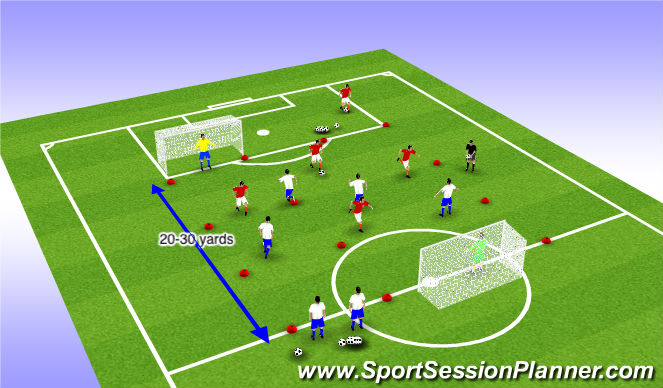
See the guidance at the top of this page to understand why you are not seeing interactive Football/Soccer images.

Defending overloads (15 mins)
2v1 & 3v2 scenarios in lanes (small or large) Minimum 6 players + 2 GKs;
Attackers begin at the start of the lane with a ball, defenders starts half way and look to win the ball. If they or goalkeeper win the ball, defender can run the ball back to the starting point. Allow both teams to counter attack once.
Coaching points:
Press: nearest player to the ball? 4S's.
Delay: Goal side, continue to stay close and show back or to edge of lane, second defender to recover if behind.
Cover & Balance: second defender covers first at around 45 degree angle behind, no more than 8 yards away. If there is a third defender, mark or support (mark space).
Compactness: Once recovered, remain as a tight unit close to the ball using press, cover & balance principles.
Control & restraint: show patience and composure, stay on feet where possible, look to win ball if attacker is shown away, takes a poor touch, takes too many touches or following a poor pass, as a last resort e.g. block shot, go to ground.
Progression:
- Have a neutral player who can help one of the defending groups at any time (recovery defender).
- Unlimited counter attacks.
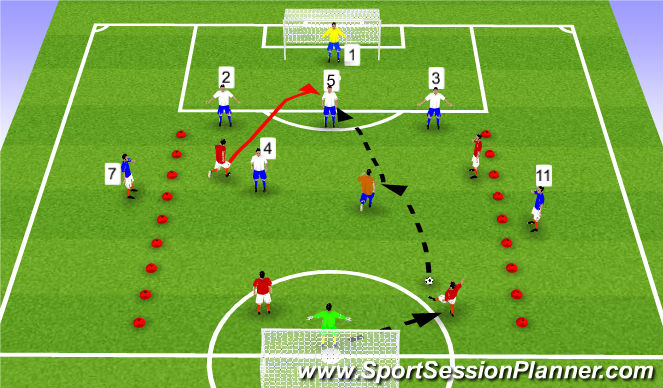
See the guidance at the top of this page to understand why you are not seeing interactive Football/Soccer images.

Learning Objectives

|
Technical 1v1 defending, tackling, blocks, interceptions |

|
Tactical Compact defending as a unit, recovery defending, delaying attacks to re-establish shape, emergency defending in the box, counter attacks. |

|
Physical Body shape and jockeying, |

|
Psychological When to win the ball, who presses, when to delay & recover, recognising when to close gaps. |

|
Social Communication to players in each individual unit and between units, team work |
Function (20 mins)
3v4 scenarios with or without recovering defender or 4v4 with neutral player and goalkeepers and optional flank players. Ball starts with either team and allow continuous play, alternating flank and neutral players at regular intervals. Encourage Defending team to go forward when they win the ball (to create gaps the opposition can exploit in transition). If the ball leaves the playing area it is either a goal kick or throw in, no corners. Defending team have 3 at the back with a midfielder who protects.
Primary Player: Centre back (5) - focus - communicate with team to ensure principles of play are adhered to.
Primary Unit: Back four (2,3 & 5) - focus - full backs (2 or 3) listen to 5's instructions in regards to dropping into a back 3 line in front of box, to press. 2 or 3 to communicate to CB to close gap between defenders, when to press, drop and so on (press, compactness & cover & balance).
Secondary Unit: Goalkeeper (1) & Defensive midfielder (4)- focus - 1 to communicate to team about recovering, who should press, cover & support and ensuring gaps are plugged (compactness).
4 to recover goalside (compactness) press when near the ball, cover & support where neccesary. If near the ball or team mates ahead, delay player on the ball and allow team to recover (compactness). Screen forward passes by opposition (delay).
Opposition management: Encourage them to get the ball forward in as few passes as possible, be direct.
Coaching points:
Press: nearest player to the ball? 4S's. Centre back encourages the nearest player to press.
Delay: Goal side, continue to stay close and show back or to edge of lane, second defender to recover if behind.
Cover & Balance: second defender covers first at around 45 degree angle behind, no more than 8 yards away. If there is a third defender, mark or support (mark space).
Compactness: Once recovered, remain as a tight unit close to the ball using press, cover & balance principles.
Control & restraint: show patience and composure, stay on feet where possible, look to win ball if attacker is shown away, takes a poor touch, takes too many touches or following a poor pass, as a last resort e.g. block shot, go to ground.
Progressions/ adaptations:
- If more players add a second neutral player or make it 5v4 for one side.
- Increase length of pitch.
- Remove wide areas and assign 4 players to be a back four one team and go like for like and keep neutral player so defending team always overloaded.
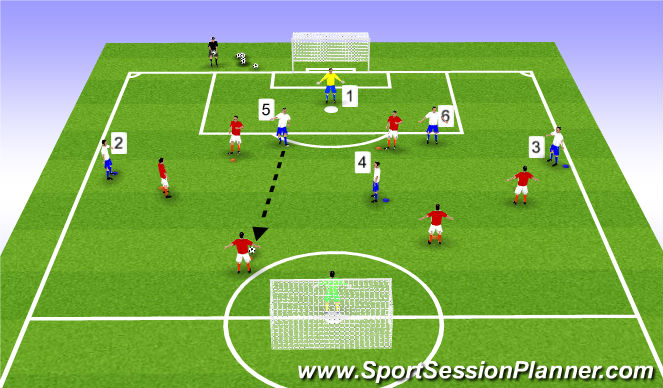
See the guidance at the top of this page to understand why you are not seeing interactive Football/Soccer images.

Game Scenario A (10 mins)
Scenario A Ball has been played by CB into midfield and the opposition has intercepted, full backs pushed up, goalkeeper up, centre midfielders ahead of the ball.
Primary Player: Centre back (5) - focus - communicate with team to ensure principles of play are adhered to.
Primary Unit: Back four (2,3,5 & 6) - focus - 2 & 3 listen to 5 or 6's instructions regarding dropping back into line of 4 in front of box, or to press player. 2 or 3 to communicate to 5 or 6 closing gaps between defenders, when to press or drop (press, compactness & cover & balance).
Secondary Unit: Goalkeeper (1) & Defensive midfielder (4)- focus - 1 to communicate to team about recovering, who should press, cover & support and ensuring gaps are plugged (compactness).
4 to recover goalside (compactness) press when near the ball, cover & support where neccesary. If near the ball or team mates ahead, delay player on the ball and allow team to recover (compactness). Screen forward passes by opposition (delay).
Opposition management: Encourage them to get the ball forward in as few passes as possible, be direct.
Coaching points:
Press: nearest player to the ball? 4S's. Centre back encourages the nearest player to press.
Delay: Goal side, continue to stay close and show back or to edge of lane, second defender to recover if behind.
Cover & Balance: second defender covers first at around 45 degree angle behind, no more than 8 yards away. If there is a third defender, mark or support (mark space).
Compactness: Once recovered, remain as a tight unit, gpal side, close to the ball using press, cover & balance principles.
Control & restraint: show patience and composure, stay on feet where possible, look to win ball if attacker is shown away, takes a poor touch, takes too many touches or following a poor pass, as a last resort go to ground e.g. block shot.
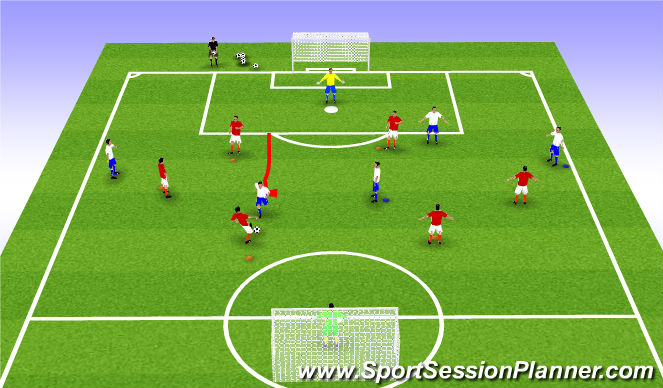
See the guidance at the top of this page to understand why you are not seeing interactive Football/Soccer images.

Scenario B (10 mins)
Scenario B Centre back has been caught high up the field with the ball, leading to gap between in defence, with full backs pushed up.
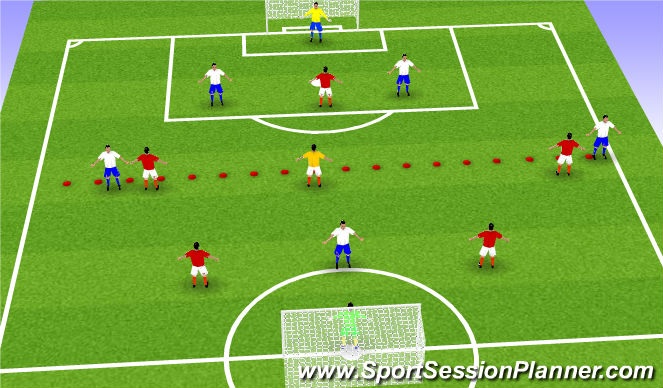
See the guidance at the top of this page to understand why you are not seeing interactive Football/Soccer images.

SSG
SSG - 5-10 minutes free play
5-10 Counter attack goals from your own half are worth double
Last 10 minute scenario 4-4 Against Ickenham away. Last 5, can a team get the winner!
Adaptations: Taper pitch if neccesary, make a half way line
Debrief: During game I want to interveiw each player or pairs for time sake and ask the following three questions:
- What are the main thins you have learnt this season?
- How do you think the team should play? With the ball, without it, formation?
At the end put primary players into seperate groups and get them to discuss the role of the primary player, who was the primary unit and secondary unit and 3 things you learnt.







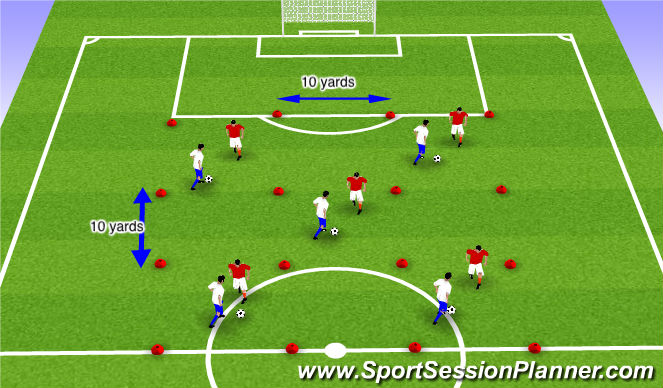
 Play animation
Play animation Play step-by-step
Play step-by-step Repeat (toggle)
Repeat (toggle) Full Screen
Full Screen Pause
Pause Stop
Stop
Arrival activity (15 mins)
Organisation: Players play 1v1 in a 10 yard in square a game of line ball where each player protect opposing sides of the square to their opponent. A point is scored for every occasion a player gets past the opponents side of the square they are protecting.
Progression:
- The player with the ball has to attempt to delay the person on the ball as they only have 1 attempt to steal the ball, this resets if the ball goes out of the area
- Make it 2 or 3 attempts if the defending player is struggling
- You only get 1 attempt per possession e.g. if you attempt to win the ball but it leads to the ball leaving the play area, you cannot tackle or steal the ball unless the opponent loses control of the ball.
- Do a tournament, 1/2 minute games, points for nutmegs.
Coaching points:
Press: Shut down; sprint towards attacker, consider curved run to begin
showing away
- Slow down; broken arm's distance
- Sit down; feet in opposition, knees bent, arms by sides, elbows bent
- Show down; Angle of approach during sprint, and body facing desired space to show attacker (e.g. to touchline nearest).
Delay: Recover; get goal side, stay close, continue to show away.
Control & restraint: show patience, wait for opportunity e.g. poor touch and use good judgement to win ball back.